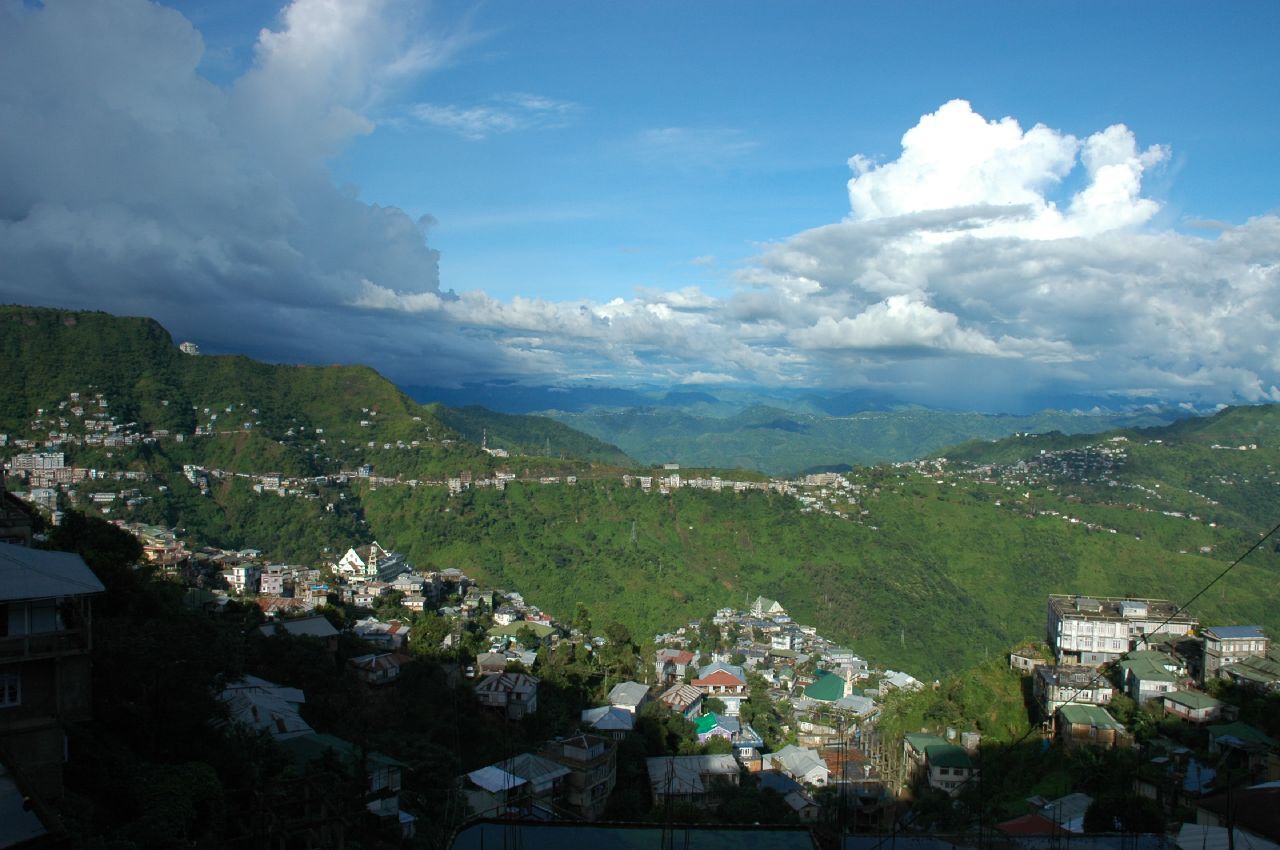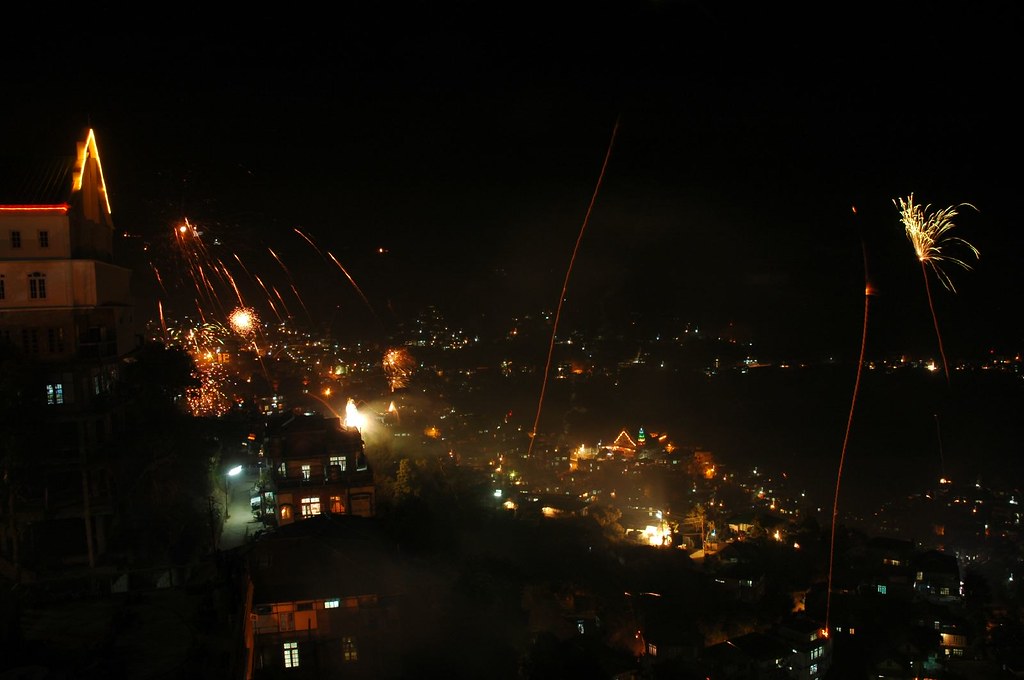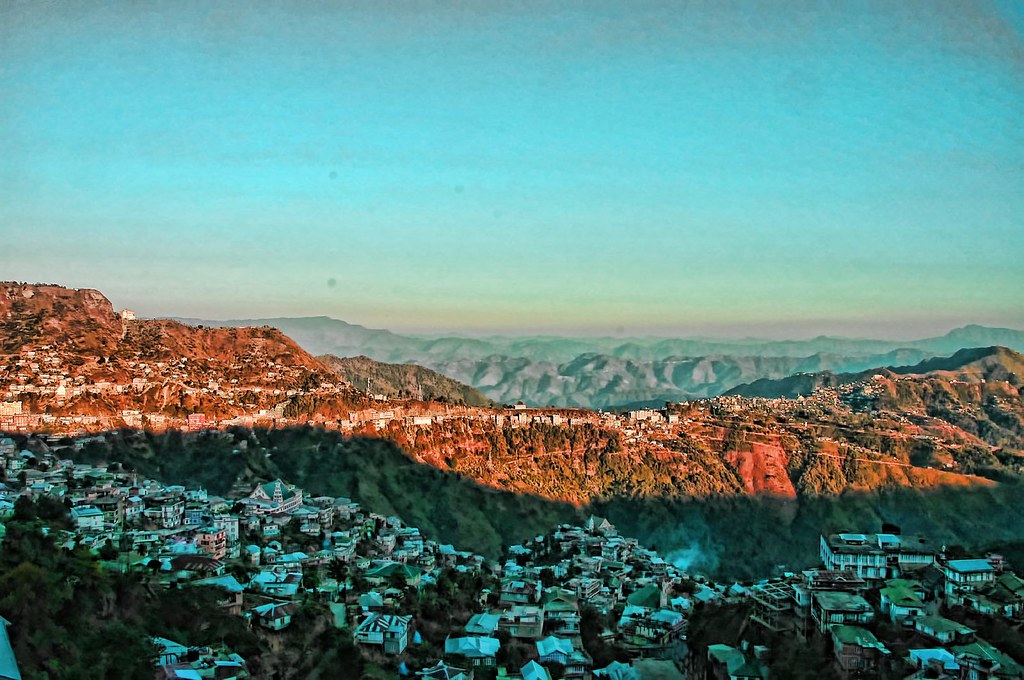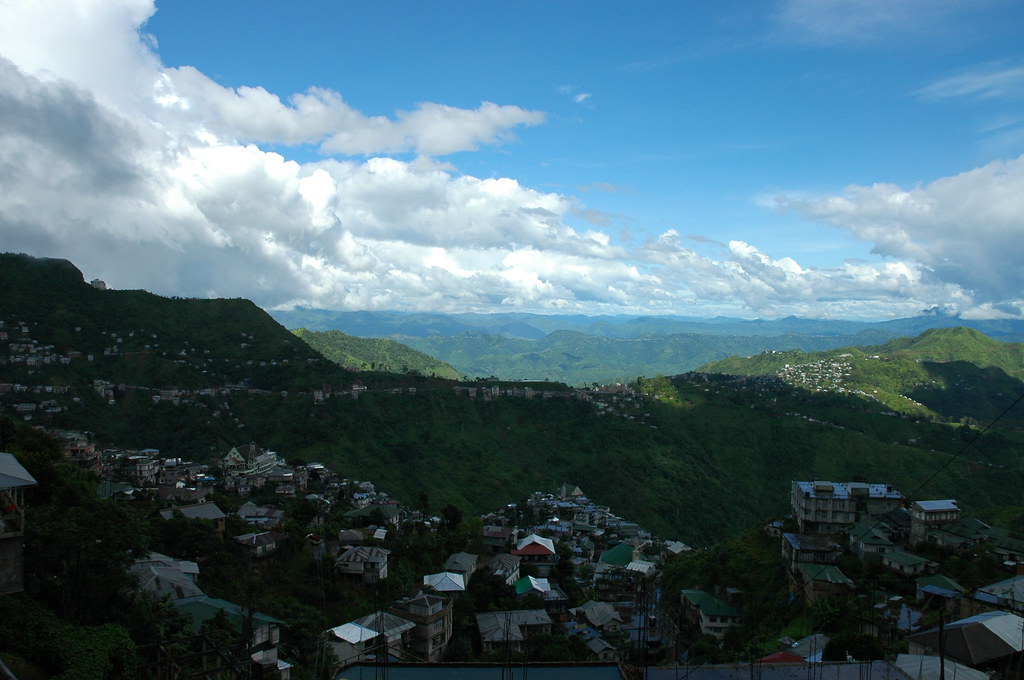
Wednesday, April 29, 2009
Ministers on joint Sri Lanka trip
he British and French foreign ministers are to make a one-day trip to Sri Lanka amid efforts to secure a truce between the army and rebels.
David Miliband of Britain and Bernard Kouchner of France will meet top officials and visit an area where displaced people are living in camps.
Swedish Foreign Minister Carl Bildt was barred from joining them for reasons he says are obscure.
Sweden recalled its foreign minister in protest against the decision.
The Czech presidency of the EU called the decision a "grave mistake".
See a map of the region
Sri Lanka has had tense relations with the Scandinavian former monitors of its peace process, though its main problems have been with the former principal mediator, Norway.
Sri Lanka said it was taken by surprise by the EU's strong reaction over Mr Bildt, who it said would be welcome to visit next month.
The British and French ministers were visiting at the foreign ministry's invitation, while very little notice of Mr Bildt's plans had been given, a Sri Lankan official said.
'Artillery and mortars'
The Sri Lankan military has restricted Tamil Tiger rebels to a 12 sq km (5 sq miles) area of land in the north of the islands and believes it is close to defeating them.
Tens of thousands of civilians have been trapped in the area, and the EU and the UN have urged Sri Lanka to observe a pause in its campaign to let them out.
The government says a halt would serve no purpose.
Diplomatic efforts to bring more help for the civilians in the war zone have so far made little progress.he British and French foreign ministers are to make a one-day trip to Sri Lanka amid efforts to secure a truce between the army and rebels.
David Miliband of Britain and Bernard Kouchner of France will meet top officials and visit an area where displaced people are living in camps.
Swedish Foreign Minister Carl Bildt was barred from joining them for reasons he says are obscure.
Sweden recalled its foreign minister in protest against the decision.
The Czech presidency of the EU called the decision a "grave mistake".
See a map of the region
Sri Lanka has had tense relations with the Scandinavian former monitors of its peace process, though its main problems have been with the former principal mediator, Norway.
Sri Lanka said it was taken by surprise by the EU's strong reaction over Mr Bildt, who it said would be welcome to visit next month.
The British and French ministers were visiting at the foreign ministry's invitation, while very little notice of Mr Bildt's plans had been given, a Sri Lankan official said.
'Artillery and mortars'
The Sri Lankan military has restricted Tamil Tiger rebels to a 12 sq km (5 sq miles) area of land in the north of the islands and believes it is close to defeating them.
Tens of thousands of civilians have been trapped in the area, and the EU and the UN have urged Sri Lanka to observe a pause in its campaign to let them out.
The government says a halt would serve no purpose.
Diplomatic efforts to bring more help for the civilians in the war zone have so far made little progress.
Sunday, April 26, 2009
On our way to Tawang - Arunachal Pradesh, India
On our way to Tawang - Arunachal Pradesh, India
Meghalaya / Shillong / Raining In My Room by The Swell Maps
Meghalaya / Shillong / Raining In My Room by The Swell Maps
Hornbill Festival 2007 in Nagaland (India)
Hornbill Festival 2007 in Nagaland (India)
Saturday, April 25, 2009
Thousands Protest Rape, Murder of Minor Girl
hainamtsi (Nagaland) Apr 25 : Thousands of people in Peren district of Nagaland on Tuesday bade a tearful adieu to six-year-old Gaipuilu Gangmei, who was raped and murdered on April 17 in Mahipalpur area of Delhi. The mortal remains of the minor reached Mhainamtsi, her native village, on Tuesday.
There was, a feeling of anger amongst the people but they were emotional too as one of their dear ones was laid to rest, after a funeral service.
The entire Jalukie subdivision in the district, on Tuesday wore a deserted look with business establishments downing shutters, schools closed and vehicles remaining off the road in more or less a spontaneous bandh to register resentment and protest at the heinous crime.
The rape and murder of Gaipuiliu had evoked strong protest and outrage amongst the North East communities residing in Delhi and the whole of the Northeastern States, particularly Nagaland.
Condemning the crime, Jalukie Valley Women Organisation (JVWO), Mhainamtsi Students Union and Zeliangrong Students’ Union organised a joint rally from Jalukie town to Mhainamtsi village demanding early justice. Thousands of people from all walks of life marched protesting against the rape and murder, carrying banners and placards demanding justice for the innocent child.
On her arrival at her village, a small placard placed on the road leading to the local ground where the funeral was held read, “Welcome home Gaipuilu”.
Talking to The Assam Tribune, President of Jalukie Village Women Organization, Dalak Nchang said that rape and murder should not be allowed to happen and demanded that the rapist allegedly one Manoj Thapa should be brought to book and punished. She said that the women will fight till justice is delivered to them.
President of Rongmei Women Organization, Peren district, Achingpui Gangmei told AT that rape of a little girl is an insult to the mothers. She was of the opinion that the law enforcing agencies should honour the Children Protection Act. “When we cannot save our own child at home, how can we ensure safety of others?” she questioned.
She also demanded that the culprits should be banished from the society and severely punished.
It may be recalled that the girl’s bruised body was found on April 16 inside a building’s empty water tank at Mahipalpur where she was staying with her mother and grandmother. Her body was flown to Guwahati on Monday evening from Delhi, accompanied by relatives. On the arrival of the mortal remains at Guwahati Airport, the Naga Students’ Union Guwahati on Monday organised a funeral service in Nagaland House.
While various Naga organizations condemned the incident, students from North East on April 18 staged a dharna outside Delhi police headquarters demanding that the culprits be booked immediately.
Martin, father of the minor victim speaking to the media, said his daughter had gone to New Delhi with her mother who is working as a nurse in Indian Spinal Injuries Hospital in the last week of January to be educated in a good metropolitan school.
“Gaipuilu was studying in Upper KG class in a Government school in Mhainamtsi before moving to New Delhi,” he said adding that her admission was due and she had been waiting for him to reach Delhi. Visibly pained at having lost his only child, he said he had booked a train ticket and was to reach New Delhi on April 20. But on the day he booked his ticket his wife called to inform that his daughter was missing.
Police yet to arrest suspect: Martin expressed dissatisfaction at the “investigation” of the Delhi police. He lamented that the police failed to arrest the main suspect named in the case, one Manoj Thapa till now. Thapa is said to be absconding; only his father is reported to have been detained by the police.
Martin also informed that the main accused Manoj used to reside in the same building and was known to the family.
The Zeliangrong Women Organization has expressed pain over the inhuman act committed upon an innocent child. The ZWO declared that the organization would not rest until the culprits involved in the crime are brought to book.
US calls for Sri Lanka ceasefire
Thursday, April 23, 2009
Polling In Six NE States Begin
Guwahati, Apr 23 : Polling in Northeast began this morning at 0700 hrs to
elect ten Lok Sabha members spanning over six states in the first phase of
elections that began amidst reports of brisk voting.
Except the sore condition in the North Cachar hills, where the politically
engineered violence is causing some panic, the north-eastern region was
free from any violence so far.
Among the six states, polling was on for three seats of Assam, two seats of
Arunachal Pradesh and Meghalaya each, and one each for Manipur, Mizoram
and Nagaland. Polling for the Inner Manipur will take place on April 22.
Arunachal Pradesh has two seats, while Nagaland and Mizoram have just one
seat each.
In Assam, three of a total 14 seats are going to polls. In Manipur over
seven lakh voters will decide the fate of nine candidates in the State’s
lone seat for the Outer Manipur Parliamentary constituency. The Congress,
BJP and the People’s Democratic Alliance (PDA) are seen as the main rivals
in the Outer Manipur Parliamentary constituency.
In Nagaland, the Congress and the Nagaland People’s Front (NPF) are locked
in a direct fight for the lone Lok Sabha seat from Nagaland.
In Meghalaya, it is the same old battle between the Congress and Nationalist
Congress Party.
In Mizoram, the stage is set for elections to the 15th Lok Sabha in Mizoram
and byelection to the South Tuipui constituency.
There are four candidates for the lone Lok Sabha seat - C L Ruala (INC), Dr
H Lallungmuana (Mizo National Front-Mizoram People’s Conference alliance),
Rualpawla (Independent for Israel National Front) and Lalawmpuia Chhangte
(NCP).
In Arunachal Pradesh, it is a tough battle between the Congress and BJP.
This election would be an acid test for both the Congress candidates Takam
Sanjoy (Arunachal West) and Ninong Ering (Arunachal East), as they are
going to lock horn with equally strong and sitting BJP MPs - Kiren Rijiju
and Tapir Gao, respectively.
India holds second election day
Sunday, April 19, 2009
Six Year Old Northeast Girl Raped and Murdered in Delhi
Curfew and the Night, Imphal Manipur
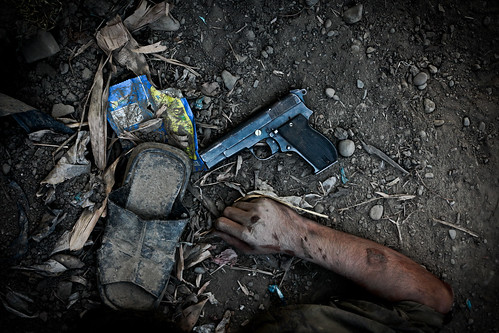 In the heat of day, all is silent in Imphal, except for the soldiers beating their sticks against the hard pavement and the dogs barking in distant neighborhoods. I had arrived a few hours earlier, unaware of the city’s uncertain state of siege, traveling past alternating police checkpoints and local highway blockades. At the series of police checkpoints my belongings were scrutinized, papers examined, and bribes paid. The local blockades were manned by angry Meithei women and children pulling on makeshift rope past burning rubber tires, as much forms of extortion as they were forms of popular protest. The bundle of ten rupee notes in my pocket helped me negotiate these barriers with more ease then most.Manipur was in a state of clampdown, the consequence of the kidnapping and brutal murder of a young dedicated officer of the Manipur Civil Service, Dr. Thingnam Kishan. His body was found along with his driver and guard, hacked to death, strewn under a bridge on one of the state’s highways on February 13. Yet another death in the face of the terror Manipur faces from the armed forces and from scores of militant groups, hardly any of it is reported except by their local media.
The insurgents have been in the region in one from or another since the birth of the country. Manipur is engulfed in a civil conflict with an almost unending stamina for death. The only difference being that more groups have mushroomed, crystallizing around the different ethnic and tribal identities. Each of these groups has their own skewed separatist agenda. What they share is a deep distrust of Indian soldiers and a love for extortion. India has pumped in almost 55,000 soldiers and loads of money in this more than half-century of conflict but neither seems to have staunched political grievances or every day misery.
In the heat of day, all is silent in Imphal, except for the soldiers beating their sticks against the hard pavement and the dogs barking in distant neighborhoods. I had arrived a few hours earlier, unaware of the city’s uncertain state of siege, traveling past alternating police checkpoints and local highway blockades. At the series of police checkpoints my belongings were scrutinized, papers examined, and bribes paid. The local blockades were manned by angry Meithei women and children pulling on makeshift rope past burning rubber tires, as much forms of extortion as they were forms of popular protest. The bundle of ten rupee notes in my pocket helped me negotiate these barriers with more ease then most.Manipur was in a state of clampdown, the consequence of the kidnapping and brutal murder of a young dedicated officer of the Manipur Civil Service, Dr. Thingnam Kishan. His body was found along with his driver and guard, hacked to death, strewn under a bridge on one of the state’s highways on February 13. Yet another death in the face of the terror Manipur faces from the armed forces and from scores of militant groups, hardly any of it is reported except by their local media.
The insurgents have been in the region in one from or another since the birth of the country. Manipur is engulfed in a civil conflict with an almost unending stamina for death. The only difference being that more groups have mushroomed, crystallizing around the different ethnic and tribal identities. Each of these groups has their own skewed separatist agenda. What they share is a deep distrust of Indian soldiers and a love for extortion. India has pumped in almost 55,000 soldiers and loads of money in this more than half-century of conflict but neither seems to have staunched political grievances or every day misery.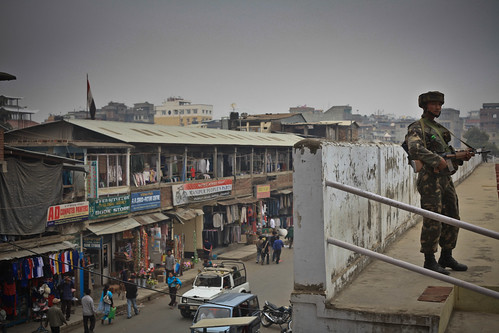 I walk over to the window and took pictures of the scene beyond the heavy grill. The suspicious black box in my possession catches the eyes of one of the soldiers, in a sudden jerk he dismounts his gun off this shoulder and points its upwards; I drop my camera and protrude my hands through the metal outwards to make my intentions clearer – my first exchange of fear.
If you have lived in Imphal long enough you will find that the life of its 3 lakh inhabitants revolves around perennial cycles of general strikes and curfew. In fact Imphal and many parts of this north east corner of India have remained in a permanent state of partial curfew for decades, a reality incomprehensible to those of us who live in metropolitan India.
I walk over to the window and took pictures of the scene beyond the heavy grill. The suspicious black box in my possession catches the eyes of one of the soldiers, in a sudden jerk he dismounts his gun off this shoulder and points its upwards; I drop my camera and protrude my hands through the metal outwards to make my intentions clearer – my first exchange of fear.
If you have lived in Imphal long enough you will find that the life of its 3 lakh inhabitants revolves around perennial cycles of general strikes and curfew. In fact Imphal and many parts of this north east corner of India have remained in a permanent state of partial curfew for decades, a reality incomprehensible to those of us who live in metropolitan India. Between 5am to 5pm, the city swings into action. Everyone is desperately trying to get a share of the cash, before it runs out. Even the most routine of transactions like buying vegetables or sugar takes on an air of siege. Come evening the streets fill with people making a hasty retreat home - as the last of Imphal throng outside ATMs before the shopkeepers down their shutters and police loudspeakers announce the coming of yet another curfew.
A large photograph of a young woman - her nose covered by a medical swatch making way for a IV tube, stoic and dogged, her eyes peer down at you – dominates a makeshift bamboo hut in New Checkon in Imphal East. This is a picture of Irom Sharmila, she has not eaten for nearly 9 years now – for this she has been locked up by government and force-fed by tubes. She launched into this almost decade long fast unto death, demanding the removal of the repressive Armed Forces Special Powers Act(AFSPA) after she witnessed the killing of 10 innocent civilians allegedly at the hands the Assam Rifles in November of 2000. Their killings like many others Manipur has witnessed came under the aegis of a law that gives the Indian army extraordinary powers to quash ethnic insurgencies. In the hut Ima K Taruni and the dozen other Meira Paibi, the torch bearers are angry as they sit in a relay hunger strike for Sharmila. “Enough is enough, we will not vote until AFSPA is revoked. What kind of democracy is this were members of our own army kill us with impunity.”
Between 5am to 5pm, the city swings into action. Everyone is desperately trying to get a share of the cash, before it runs out. Even the most routine of transactions like buying vegetables or sugar takes on an air of siege. Come evening the streets fill with people making a hasty retreat home - as the last of Imphal throng outside ATMs before the shopkeepers down their shutters and police loudspeakers announce the coming of yet another curfew.
A large photograph of a young woman - her nose covered by a medical swatch making way for a IV tube, stoic and dogged, her eyes peer down at you – dominates a makeshift bamboo hut in New Checkon in Imphal East. This is a picture of Irom Sharmila, she has not eaten for nearly 9 years now – for this she has been locked up by government and force-fed by tubes. She launched into this almost decade long fast unto death, demanding the removal of the repressive Armed Forces Special Powers Act(AFSPA) after she witnessed the killing of 10 innocent civilians allegedly at the hands the Assam Rifles in November of 2000. Their killings like many others Manipur has witnessed came under the aegis of a law that gives the Indian army extraordinary powers to quash ethnic insurgencies. In the hut Ima K Taruni and the dozen other Meira Paibi, the torch bearers are angry as they sit in a relay hunger strike for Sharmila. “Enough is enough, we will not vote until AFSPA is revoked. What kind of democracy is this were members of our own army kill us with impunity.”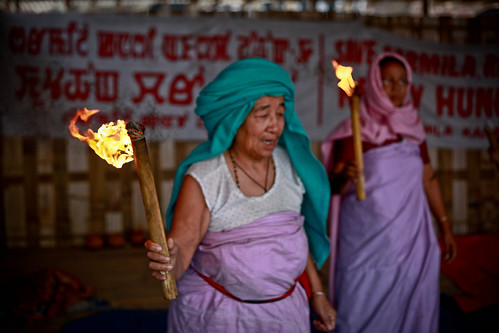 The smog gently floats over the valley in a vacuum left by the pause of violence; in the days that follow it is the Yaoshang festival. A quiet before the storm only to be pierced by gun fire. In the streets people scatter, shop shutters come rumbling down and all is once more quiet in anticipation of the next rattle of bullets. A photographer’s job is filled with fool’s errands; we chase gunfire instead of escaping it. Meters away in Imphal’s Kunjabi lekhai I find them breathing their last-two young men murdered and branded as insurgents in yet another encounter. A 9mm pistol, a grenade and some documents enough proof. People watch as their bodies are propped and put onto the back of a pickup truck by a lanky policeman. In Manipur death itself has become a spectacle.
The smog gently floats over the valley in a vacuum left by the pause of violence; in the days that follow it is the Yaoshang festival. A quiet before the storm only to be pierced by gun fire. In the streets people scatter, shop shutters come rumbling down and all is once more quiet in anticipation of the next rattle of bullets. A photographer’s job is filled with fool’s errands; we chase gunfire instead of escaping it. Meters away in Imphal’s Kunjabi lekhai I find them breathing their last-two young men murdered and branded as insurgents in yet another encounter. A 9mm pistol, a grenade and some documents enough proof. People watch as their bodies are propped and put onto the back of a pickup truck by a lanky policeman. In Manipur death itself has become a spectacle.Thursday, April 16, 2009
Millions of Indians go to polls
 I
ndians are voting in the first round of the country's 15th general elections.
Voters in 124 constituencies are taking part in the ballot. There has so far been a steady turnout, marred by several attacks from Maoist insurgents.
More than 700 million Indians overall are eligible to vote for seats in the lower house of parliament.
The incumbent Congress-led coalition government is facing a challenge from the main opposition BJP-led alliance.
The two main blocs are also competing against a "third front" of communist and regional parties in a poll that is too close to call. Results are due on 16 May and a new parliament must be in place by 2 June.
Voters began queuing up early at many polling stations across the country. TV pictures showed women queuing in Assam in light drizzle.
Among high profile candidates who cast votes early was former UN diplomat Shashi Tharoor in the southern city of Thiruvananthapuram.
"It is a great privilege to vote. It is an extra bonus to vote for myself," said Mr Tharoor, who is standing for the Congress party. "I should be able to romp home."
A massive security operation is in place across India. In the eastern state of Jharkhand six paramilitary soldiers were killed in a landmine blast blamed on Maoist rebels, police said.
Maoists also attacked polling booths in the states of Orissa and Bihar. The BBC's Chris Morris in Delhi says they were isolated incidents in remote rural areas, but still disruptive and carried out to prevent people voting.
In Bihar's Gaya district a polling booth was attacked. Two security personnel were killed and two female voters received bullet wounds, locals told the BBC. In addition the insurgents looted electronic voting machines and four police rifles.
Officials in the state say that 264 booths in areas where the Maoists are active will close down two hours ahead of time as a security precaution.
The attack in Orissa took place in Malkangiri district, where the insurgents burned some electronic voting machines, police said. The rebels have also blocked roads in the district after felling trees.
Local issues
The first voting is taking place in constituencies spread across the country, including volatile areas in north and central India.
States where voting takes place are Andhra Pradesh, Arunachal Pradesh, Assam, Bihar, Jammu and Kashmir, Kerala, Maharashtra, Manipur, Meghalaya, Mizoram, Nagaland, Orissa, Uttar Pradesh, Chhattisgarh, Jharkhand, Lakshwadeep and the Andaman and Nicobar Islands.
More than two million security personnel have been deployed, many of them in the southern state of Andhra Pradesh, which is voting for both national and state assembly representatives.
"We have taken every necessary measure to ensure peaceful, free and fair elections. Now you go out and vote," state director general of police AK Mohanty said in the state capital, Hyderabad.
Thousands of troops have also been placed on alert in the northern state of Uttar Pradesh, which has the most seats in the national parliament. Polling will take place for 16 of the state's 80 seats.
Neither of the two main parties in the election - Congress and the Bharatiya Janata Party (BJP) - is expected to gain a clear majority.
Both may have to depend on the support of smaller parties to form a government - and correspondents say the campaign rhetoric in recent days has become increasingly bitter.
While security and the economy are key election issues, especially after last year's attacks in Mumbai (Bombay), global economic meltdown and local and regional issues are all expected to be key issues.
I
ndians are voting in the first round of the country's 15th general elections.
Voters in 124 constituencies are taking part in the ballot. There has so far been a steady turnout, marred by several attacks from Maoist insurgents.
More than 700 million Indians overall are eligible to vote for seats in the lower house of parliament.
The incumbent Congress-led coalition government is facing a challenge from the main opposition BJP-led alliance.
The two main blocs are also competing against a "third front" of communist and regional parties in a poll that is too close to call. Results are due on 16 May and a new parliament must be in place by 2 June.
Voters began queuing up early at many polling stations across the country. TV pictures showed women queuing in Assam in light drizzle.
Among high profile candidates who cast votes early was former UN diplomat Shashi Tharoor in the southern city of Thiruvananthapuram.
"It is a great privilege to vote. It is an extra bonus to vote for myself," said Mr Tharoor, who is standing for the Congress party. "I should be able to romp home."
A massive security operation is in place across India. In the eastern state of Jharkhand six paramilitary soldiers were killed in a landmine blast blamed on Maoist rebels, police said.
Maoists also attacked polling booths in the states of Orissa and Bihar. The BBC's Chris Morris in Delhi says they were isolated incidents in remote rural areas, but still disruptive and carried out to prevent people voting.
In Bihar's Gaya district a polling booth was attacked. Two security personnel were killed and two female voters received bullet wounds, locals told the BBC. In addition the insurgents looted electronic voting machines and four police rifles.
Officials in the state say that 264 booths in areas where the Maoists are active will close down two hours ahead of time as a security precaution.
The attack in Orissa took place in Malkangiri district, where the insurgents burned some electronic voting machines, police said. The rebels have also blocked roads in the district after felling trees.
Local issues
The first voting is taking place in constituencies spread across the country, including volatile areas in north and central India.
States where voting takes place are Andhra Pradesh, Arunachal Pradesh, Assam, Bihar, Jammu and Kashmir, Kerala, Maharashtra, Manipur, Meghalaya, Mizoram, Nagaland, Orissa, Uttar Pradesh, Chhattisgarh, Jharkhand, Lakshwadeep and the Andaman and Nicobar Islands.
More than two million security personnel have been deployed, many of them in the southern state of Andhra Pradesh, which is voting for both national and state assembly representatives.
"We have taken every necessary measure to ensure peaceful, free and fair elections. Now you go out and vote," state director general of police AK Mohanty said in the state capital, Hyderabad.
Thousands of troops have also been placed on alert in the northern state of Uttar Pradesh, which has the most seats in the national parliament. Polling will take place for 16 of the state's 80 seats.
Neither of the two main parties in the election - Congress and the Bharatiya Janata Party (BJP) - is expected to gain a clear majority.
Both may have to depend on the support of smaller parties to form a government - and correspondents say the campaign rhetoric in recent days has become increasingly bitter.
While security and the economy are key election issues, especially after last year's attacks in Mumbai (Bombay), global economic meltdown and local and regional issues are all expected to be key issues.
Message Behind The Assam Blasts
Monday, April 13, 2009
Mizoram Observes Easter Sunday

Bandh in North Cachar Hills District, Assam

Tuesday, April 7, 2009
Chin People Suffer From Inadequate Protection in India

Saurabhee Lives Up To Her Rock Star Image
 he northeast sensation and India’s Latest Idol Saurabhee is ready to rock the music scene with her new album and her very first commercial track - Meherbaan.
Saurabhee had a dream run in Indian Idol 4 each and every performace of hers was amazing. She was the best consistent and the least hyper contestant.
She kept her cool all through out the season and became a winner not only of Indian Idol but also of audiences’ hearts.
Now with her very first music video release she is out there in open to try her luck in tinsel town with her talent.
The sound track is good but video is average… it’s a bad example of creativity block.
Saurabhee is not only a good singer but has an amazing personality the video fails to acknowledge it rather it is a rip from Madonna’s famous song “Don’t tell me to stop”.
Saurabhee’s voice is fresh is bubbly in the music track if this one strikes with the audiences then the girl is sure to rock for a very long time.
he northeast sensation and India’s Latest Idol Saurabhee is ready to rock the music scene with her new album and her very first commercial track - Meherbaan.
Saurabhee had a dream run in Indian Idol 4 each and every performace of hers was amazing. She was the best consistent and the least hyper contestant.
She kept her cool all through out the season and became a winner not only of Indian Idol but also of audiences’ hearts.
Now with her very first music video release she is out there in open to try her luck in tinsel town with her talent.
The sound track is good but video is average… it’s a bad example of creativity block.
Saurabhee is not only a good singer but has an amazing personality the video fails to acknowledge it rather it is a rip from Madonna’s famous song “Don’t tell me to stop”.
Saurabhee’s voice is fresh is bubbly in the music track if this one strikes with the audiences then the girl is sure to rock for a very long time.
Powered by ScribeFire.
